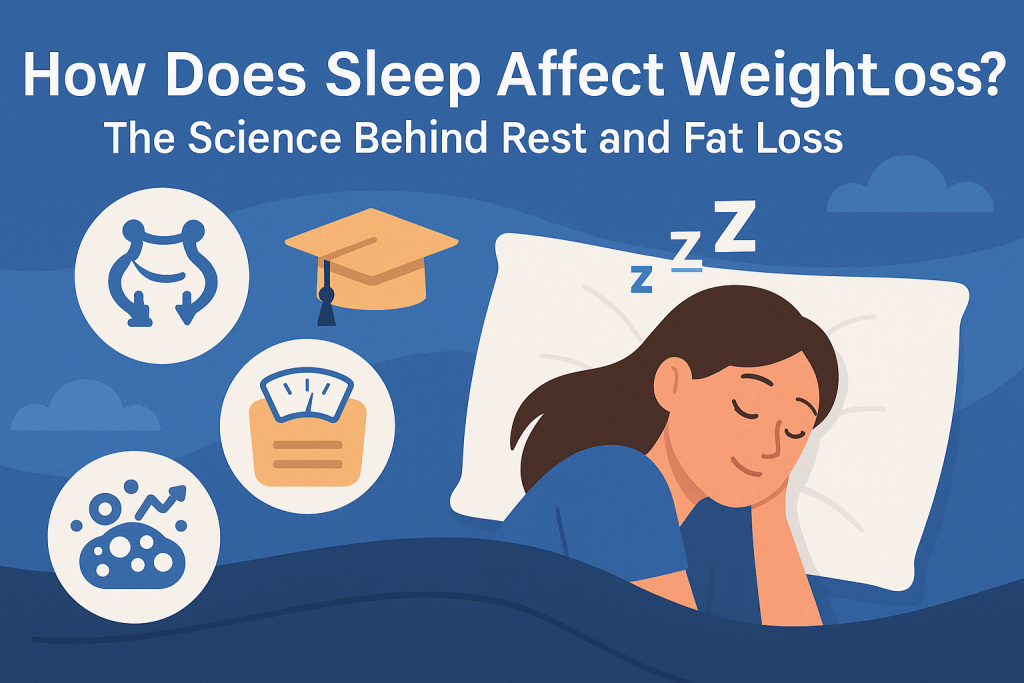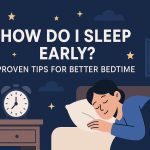If you’ve ever wondered how sleep affects weight loss, you’re not alone. Many people focus on diet and exercise when trying to lose weight, but often overlook the powerful role of sleep. In fact, mounting scientific research suggests that how much and how well you sleep can significantly influence your body’s ability to shed pounds and maintain a healthy weight.
Understanding the Connection Between Sleep and Weight Loss
Sleep is not just a passive state in which the body rests. It’s an active, biologically crucial process that affects essentially every system in the body, including metabolism, appetite regulation, and fat storage. Here’s what happens when you don’t get enough quality sleep – and why it matters for weight management.
1. Sleep and Metabolism: Burning Calories Even at Rest
The body burns calories all the time, even during sleep. Adequate rest helps your metabolism function efficiently, controlling how your body converts food into energy and stores fat. Research has shown that sleep deprivation can slow down your metabolism, making it harder to lose weight—even if you’re eating well and exercising.
- Resting metabolic rate (RMR): Lack of sleep can reduce your RMR, meaning you burn fewer calories at rest.
- Energy balance: Poor sleep may lead to lower energy expenditure overall and less motivation to be physically active.
2. The Role of Hormones: Ghrelin and Leptin
Hunger and appetite are controlled by two key hormones: ghrelin (the “hunger hormone”) and leptin (the “fullness hormone”). When you don’t get enough sleep:
- Ghrelin levels increase, causing you to feel hungrier.
- Leptin levels decrease, making it harder to feel satisfied after eating.
This hormonal imbalance leads to increased hunger, more frequent snacking, and cravings for high-calorie, sugary foods—all of which can sabotage weight loss efforts.
3. Sleep Deprivation Increases Cravings and Appetite
Missing out on sleep doesn’t just alter hormones; it also affects brain regions responsible for decision-making and impulse control. Studies suggest that when you’re sleep-deprived, you’re more likely to:
- Seek out high-fat, high-carb foods for quick energy
- Overeat, especially late at night
- Make poor dietary choices due to reduced willpower
These factors combined can lead to a caloric surplus and weight gain, rather than weight loss.
4. Sleep and Fat Storage: The Cortisol Connection
Cortisol, the body’s “stress hormone,” tends to be higher when you’re sleep deprived. Elevated cortisol promotes fat storage, particularly around the abdomen. This type of fat, known as visceral fat, is not only stubborn but also associated with increased health risks, including heart disease and type 2 diabetes.
5. Impact on Physical Activity and Exercise Recovery
A lack of quality sleep can leave you feeling tired, less motivated, and more prone to skipping workouts or moving less throughout the day. Additionally, sleep is crucial for muscle recovery and repair after exercise. If you’re not sleeping well:
- Workout performance suffers
- Muscle-building and fat-burning processes are impaired
- You may experience more soreness and less progress over time
Scientific Evidence: What Studies Say About Sleep and Weight Loss
Numerous studies point to a strong link between sleep and body weight:
- Short Sleep Duration: People who regularly get fewer than 6 hours of sleep per night are more likely to have a higher body mass index (BMI) and gain weight over time, according to research published in the American Journal of Epidemiology.
- Improved Weight Loss Results: A clinical trial in the journal Annals of Internal Medicine found that dieters who got adequate sleep lost more fat compared to those who were sleep deprived—even when both groups ate the same number of calories.
- Better Metabolic Health: Consistent, high-quality sleep is linked to improved glucose metabolism and insulin sensitivity, both of which make fat loss easier.
How Much Sleep Do You Need for Weight Loss?
While individual needs vary slightly, most adults require 7-9 hours of sleep per night for optimal health and weight management. If you’re consistently getting less, making sleep a priority may help accelerate your fat loss efforts and improve your well-being in the process.
Signs You’re Not Getting Enough Sleep
- Trouble waking up in the morning
- Relying on caffeine to stay alert
- Frequent food cravings, especially for sweets and carbs
- Moodiness and irritability
- Lack of motivation to exercise
Tips to Improve Sleep for Better Weight Loss Results
- Stick to a consistent schedule: Go to bed and wake up at the same times each day, even on weekends.
- Create a relaxing bedtime routine: Avoid screens, caffeine, and heavy meals before bed. Try reading or meditating.
- Optimize your sleep environment: Keep your bedroom cool, dark, and quiet.
- Be mindful of naps: Limit daytime naps to 20-30 minutes to avoid disrupting nighttime sleep.
- Move your body: Regular physical activity can help you fall asleep faster and enjoy deeper sleep—but avoid vigorous exercise close to bedtime.
Frequently Asked Questions About Sleep and Weight Loss
Can sleeping more actually help me lose weight?
Yes, getting adequate sleep can help regulate hunger hormones, reduce cravings, improve metabolism, and support your fat loss goals—especially when combined with healthy eating and regular exercise.
What if I have trouble sleeping?
If you struggle with chronic insomnia or sleep disorders, it’s important to talk to a healthcare provider for guidance. Even minor improvements in sleep quality can make a noticeable difference in your weight loss journey.
Is it better to sleep more or exercise more for weight loss?
Both sleep and exercise are essential for health and weight management. Prioritizing both will yield the best results, as insufficient sleep can undermine your exercise efforts and vice versa.
Conclusion: Prioritize Sleep for Lasting Weight Loss Success
In the quest to lose weight, sleep is often overlooked, yet it’s a powerful ally. By understanding how sleep affects weight loss, you can make more informed choices and set yourself up for lasting success. Prioritize restful nights along with healthy eating and movement, and you’re likely to see better results—both on the scale and in how you feel every day.


